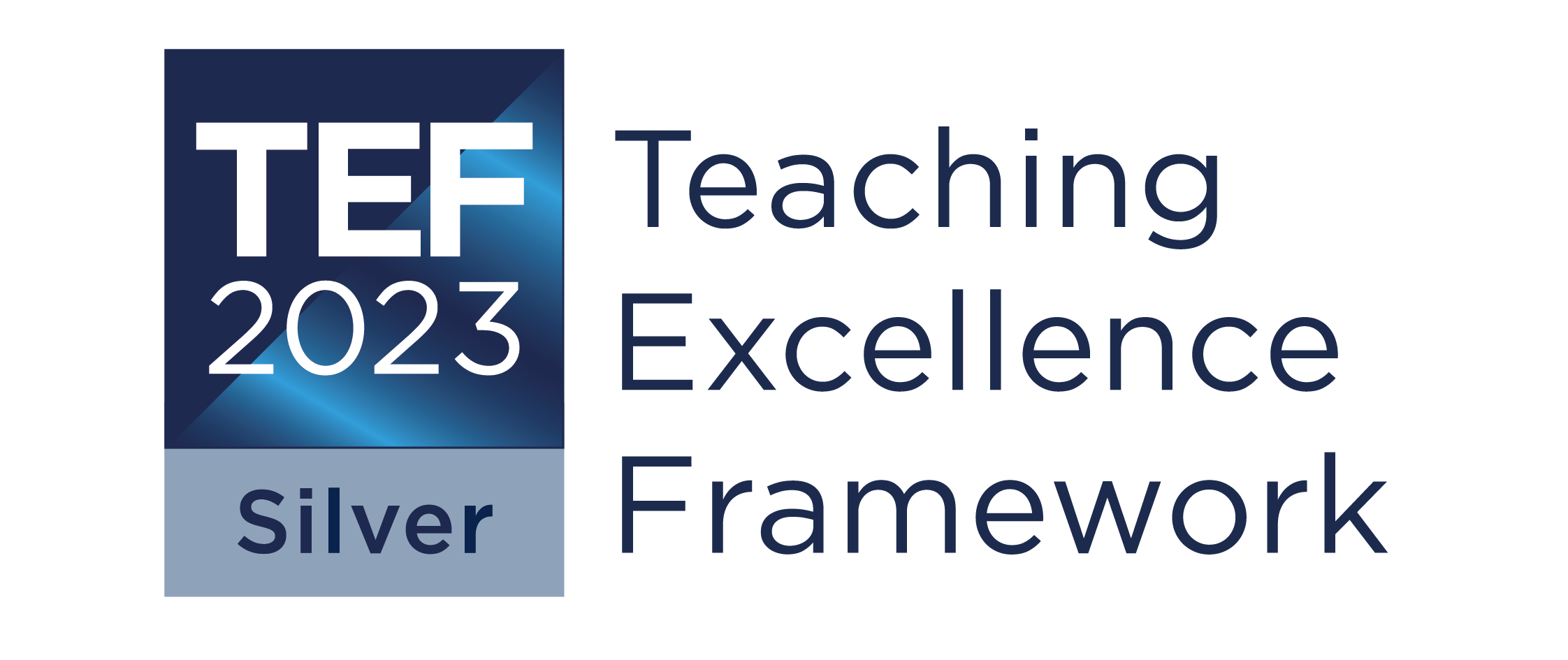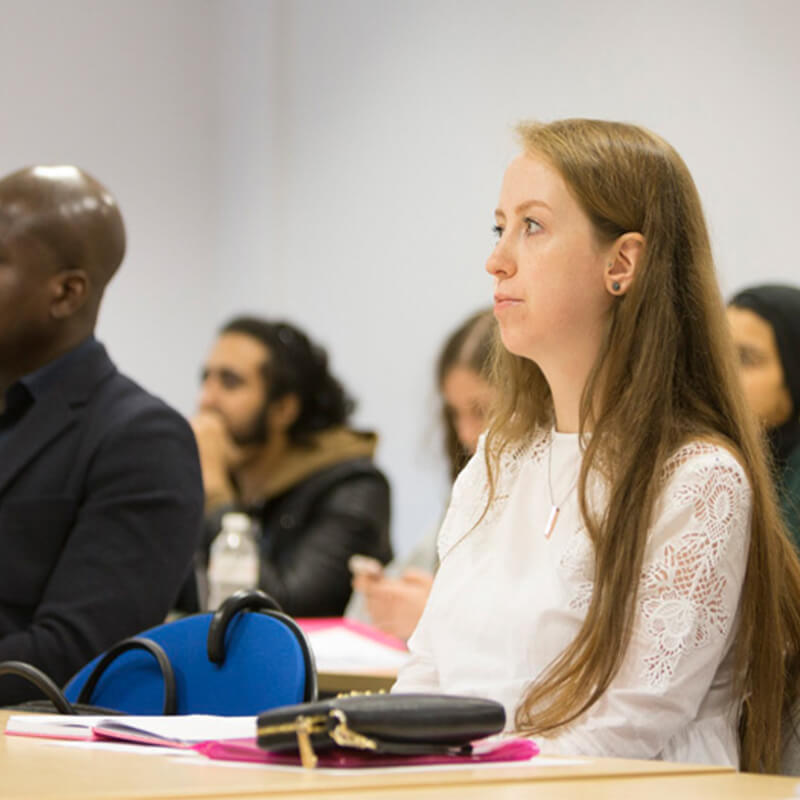Entry tariff:
No formal qualifications required, please see Entry Requirements section below.
Start date(s):
September 2025
September 2026
Clearing
CLEARING 2025
Be Roehampton
Open for Clearing
Call us on 0300 303 8320Complete our Clearing self-application
Are you ready to learn and develop fluency in discussing the major doctrines that have shaped the Christian faith? This course will give you the skills to succeed in studying and teaching the Old and New Testaments.
Did you know?
You will not only develop academic skills but also practical ones, enabling you to effectively study, teach, and discuss the major doctrines that have shaped Christianity over the past 2000 years.
When you graduate you will receive a Certificate of Higher Education, equating to 120 credits at Level 4, providing a solid foundation for further study or career advancement in various fields such as church leadership, education, counselling, and social services.
Top modern university in London in Theology & Religious Studies
(Complete University Guide 2025)

Silver in the 2023 Teaching Excellence Framework (TEF)
For delivering high quality teaching, learning and outcomes for our students.

Theology and Religious Studies ranked 1st in London in all categories (NSS 2024)
National Student Survey 2024

Similar courses available include:
• FdA/BTh in Theology Practice and Mission
• Church Minister Degree Apprenticeship
Modules

Skills
Develop your professional skills as you study real-life applications of Biblical Studies and Theology.
During your time with us, you’ll explore:
- Developing the knowledge and skills to effectively study and teach the Old and New Testaments.
- Learning how to see your own beliefs and practices within the context of the church’s 2000 year history.
- Gaining fluency in discussing the major doctrines that have shaped the Christian faith.
Students who successfully complete the course will receive a Certificate of Higher Education which equates to 120 credits at Level 4.
Learning
Enjoy a personal and practical approach to your studies.
Full-time students will attend online classes on Tuesday evenings, and face to face teaching on campus on Saturdays, for a period of 10 months. If you are interested in studying part-time or entirely online, please contact us to discuss study options.
You’ll learn through practical activities as well as lectures, with discussions, presentations, teamwork and feedback playing a key role in your studies.


Dr David Clark
Originally from the United States, I’ve had the opportunity to travel and teach in 35 nations (particularly in Latin America).
My area of academic expertise is historical theology, and I have a particular interest in the way prayer and theological belief have contributed to historical Christian identity formation. Academia is something of a ‘2nd career’ for me, as I have spent most of my adult life in missional leadership. Consequently, I have a deep interest in global cultures, discipleship and organisational leadership. The modules I teach include Theology & Practice of Mission, History of Christian Thought and History of the Bible in London.

Dr John Moxon
I'm a Principle Lecturer in Biblical Studies and Head of Religion, Theology, Culture and Philosophy. My research interests include early Jewish Christianity and revelatory and other charismatic phenomena in the Graeco-Roman world. I previously taught biblical studies in the Selly Oak Colleges, Birmingham and the Assemblies of God training college in Nottinghamshire. I have studied variously at the universities of Cambridge, Oxford and Durham, as well as at Wycliffe Hall, All Nations Christian College and the Queens Foundation.

Rev Dr Daniel Eshun
I am an Anglican Chaplain, Dean of Chapel at Whitelands College and Lecturer in Theology, Mission & Practice. My research interests include anthropological, sociological and theological analysis of liturgy, mission, evangelism and nurture in African Churches (Catholic and Protestant), and the interaction between African Traditional Religions, Catholicism, Islam, Pentecostalism and Charismatic movements.

Dr Richard Burgess
My areas of teaching expertise include Pentecostal theology and practice, Christian education, biblical hermeneutics, and theology of religions/interfaith dialogue. As well as teaching on the FdA/BTh in Theology, Mission and Practice, I am the co-convenor of the MA Theology and Religious Studies programme. Prior to coming to Roehampton, I taught theology in Nigeria. My research interests include Christianity in Africa and the African diaspora, religions and development, and Pentecostal approaches to healing and health. I have published widely on Christianity in Africa and the African diaspora in Britain. My most recent book is titled Nigerian Pentecostalism and Development (2020). I gained my PhD from the University of Birmingham

Dr Clare Watkins
I am a Roman Catholic, lay woman theologian, committed to teaching and research in the areas of ecclesioogy, sacramental theology and practical theology, and with a particular concern for working theologically in ways that contribute to ministerial formation and church life and mission. Having completed my doctorate under the supervision of Professor Stephen Sykes, in 1990, I juggled pastoral and theological work with raising our four children. During this time I was lucky enough to work pastorally as a lay assistant in parish and student chaplaincy ministries, and to develop teaching and research at Margaret Beaufort Institute of Theology, in the Cambridge Theological Federation, (Vice Principal and Director of Studies) and at Allen Hall, the Westminster Catholic seminary. A major part of recent work has been with the Heythrop Institute

Dr Ashley Cocksworth
I’ve been lecturing at Roehampton since 2018. Most of my teaching is in Christian doctrine, and across these modules I’m especially interested in thinking about the relation between doctrine and practice. How is belief expressed in practice? And how does practice shape and is shaped by belief? I research in this area too. I’ve published widely on the theme of prayer, and I’m currently finishing a book on the theme of glorification. My next major book is on joy (which involves thinking theologically about the smile as the embodiment of joy). Before Roehampton I worked in the context of ministerial formation – first in Birmingham and then at Durham University – and have retained an interest in how theology is understood and practised in the life of the churches.

Dr R David Muir
I am Head of Whitelands College, and a Senior Lecturer in Public Theology & Community Engagement. I am a political scientist and theologian.
My career began as a secondary school teacher in south London where I taught Religious Education and History. I am a former head of research and regional development at the Commonwealth Institute and Home Office adviser on policing, diversity and community relations. I have taught history, theology and politics at a number of UK universities and colleges, including Goldsmiths College, Simon of Cyrene Theological Institute, Canterbury Christ Church University and the Centre for Black and White Christian Partnership.

Dr Andrew Rogers
I'm a Principal Lecturer in Practical Theology and a Programme Convenor. My research interests include New Black Majority Churches, especially aesthetics and growth; Faith, place & planning; 'Ordinary hermeneutics' - that is, the hermeneutical practices of ordinary Bible readers; use of the Bible in practical theology; interdisciplinary issues between theology and social science; use of ethnography in practical theology research; aspects of evangelicalism and fundamentalism; missiology; aspects of contemporary ecclesiology.
Career
As a graduate of Biblical Studies and Theology (Certificate of Higher Education), you will gain a deeper knowledge of Biblical Studies & Theology.
This will enhance your service as:
- Deacons, elders, council members, or administrators in local churches
- Bible Study leaders and Sunday School teachers
- Worship leaders
- Missionaries
- Licensed counsellors
- Social service workers
- Charity and third sector workers
- Licensed educators working in schools affiliated with a church
This course of study is also an excellent option if you are considering careers in Christian service, but may not be ready to commit to a longer course of study. After completion of this course, you can easily transition into the FdA/BTh programme.

Wherever you want to go in the future, you’ll be preparing for the world of work from day one at Roehampton, with regular access to:
- Career development events
- Guest industry speakers
- Networking opportunities
- Personalised mentoring and careers support
You’ll graduate ready to grab every opportunity that comes your way.
Our careers support team is available to support you from the start of your studies until after you graduate. We will help you build your CV, prepare for interviews, and meet and learn from successful graduates working at the top of their careers.
You’ll also have opportunities to work with our partners across London and beyond, and to attend a Roehampton jobs fair where you can find out about graduate opportunities and meet employers.
Open days
Get a real taste of our campus, community and what it’s like to study at Roehampton
Applying
Full-time UK undergraduate students apply through our direct application system.
There are no formal entry requirements and you will not be expected to have any academic or theological background although, where appropriate, those who have already done some church-related study will be welcome.
Applicants interested in joining advised to contact mtenquiries@roehampton.ac.uk to receive additional information and guidance on how to apply for September 2024 entry. All applicants are required to attend an interview.
Looking to work out your UCAS points or find out about our entry requirements? Find out more.
When we consider applications to study with us, we form a complete view of your achievements to date, and future potential, and can offer flexibility in entry requirements. Find out more about our Contextual Offer scheme.
General entry requirements
September 2025 entry tuition fees
UK (home) tuition fees
Undergraduate degree: £9,535
We offer a wide range of scholarships and bursaries. See our financial support pages for UK students.
We also provide other ways to support the cost of living, including free buses and on-campus car parking, hardship support and some of the most affordable student accommodation and catering in London. Find out more about how we can support you.
International undergraduate students apply through our direct application system.
There are no formal entry requirements and you will not be expected to have any academic or theological background although, where appropriate, those who have already done some church-related study will be welcome.
Applicants interested in joining advised to contact mtenquiries@roehampton.ac.uk to receive additional information and guidance on how to apply. All applicants are required to attend an interview.
Looking to work out your UCAS points or find out about our entry requirements? Find out more.
When we consider applications to study with us, we form a complete view of your achievements to date, and future potential, and can offer flexibility in entry requirements. Find out more about our Contextual Offer scheme.
General entry requirements
September 2025 entry tuition fees
EU and international tuition fees
Undergraduate degree: £16,950
We offer a wide range of scholarships and bursaries. See our financial support pages for international students.
We also provide other ways to support the cost of living, including free buses and on-campus car parking, hardship support and some of the most affordable student accommodation and catering in London. Find out more about how we can support you.





